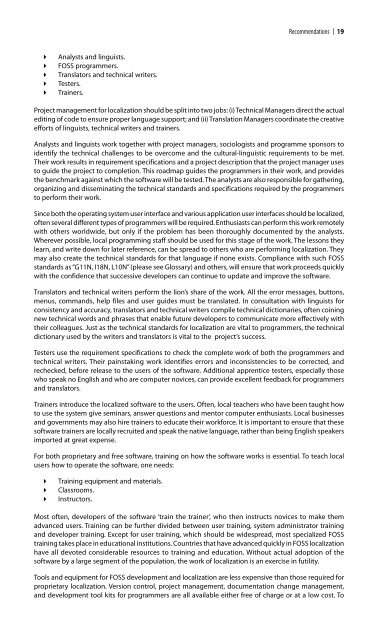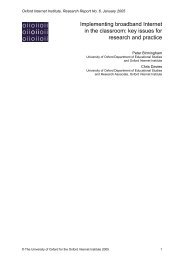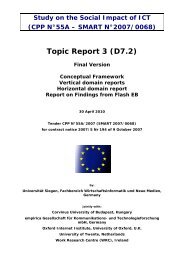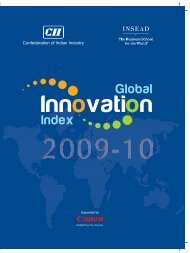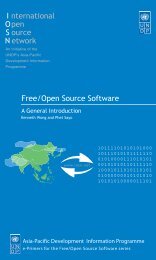Create successful ePaper yourself
Turn your PDF publications into a flip-book with our unique Google optimized e-Paper software.
Recommendations ❘ 19Analysts and linguists.FOSS programmers.Translators and technical writers.Testers.Trainers.Project management for localization should be split into two jobs: (i) Technical Managers direct the actualediting of code to ensure proper language support; and (ii) Translation Managers coordinate the creativeefforts of linguists, technical writers and trainers.Analysts and linguists work together with project managers, sociologists and programme sponsors toidentify the technical challenges to be overcome and the cultural-linguistic requirements to be met.Their work results in requirement specifications and a project description that the project manager usesto guide the project to completion. This roadmap guides the programmers in their work, and providesthe benchmark against which the software will be tested. The analysts are also responsible for gathering,organizing and disseminating the technical standards and specifications required by the programmersto perform their work.Since both the operating system user interface and various application user interfaces should be localized,often several different types of programmers will be required. Enthusiasts can perform this work remotelywith others worldwide, but only if the problem has been thoroughly documented by the analysts.Wherever possible, local programming staff should be used for this stage of the work. The lessons theylearn, and write down for later reference, can be spread to others who are performing localization. Theymay also create the technical standards for that language if none exists. Compliance with such FOSSstandards as “G11N, I18N, L10N” (please see Glossary) and others, will ensure that work proceeds quicklywith the confidence that successive developers can continue to update and improve the software.Translators and technical writers perform the lion’s share of the work. All the error messages, buttons,menus, commands, help files and user guides must be translated. In consultation with linguists forconsistency and accuracy, translators and technical writers compile technical dictionaries, often coiningnew technical words and phrases that enable future developers to communicate more effectively withtheir colleagues. Just as the technical standards for localization are vital to programmers, the technicaldictionary used by the writers and translators is vital to the project’s success.Testers use the requirement specifications to check the complete work of both the programmers andtechnical writers. Their painstaking work identifies errors and inconsistencies to be corrected, andrechecked, before release to the users of the software. Additional apprentice testers, especially thosewho speak no English and who are computer novices, can provide excellent feedback for programmersand translators.Trainers introduce the localized software to the users. Often, local teachers who have been taught howto use the system give seminars, answer questions and mentor computer enthusiasts. Local businessesand governments may also hire trainers to educate their workforce. It is important to ensure that thesesoftware trainers are locally recruited and speak the native language, rather than being English speakersimported at great expense.For both proprietary and <strong>free</strong> software, training on how the software works is essential. To teach localusers how to operate the software, one needs:Training equipment and materials.Classrooms.Instructors.Most often, developers of the software ‘train the trainer’, who then instructs novices to make themadvanced users. Training can be further divided between user training, system administrator trainingand developer training. Except for user training, which should be widespread, most specialized FOSStraining takes place in educational institutions. Countries that have advanced quickly in FOSS localizationhave all devoted considerable resources to training and education. Without actual adoption of thesoftware by a large segment of the population, the work of localization is an exercise in futility.Tools and equipment for FOSS development and localization are less expensive than those required forproprietary localization. Version control, project management, documentation change management,and development tool kits for programmers are all available either <strong>free</strong> of charge or at a low cost. To


